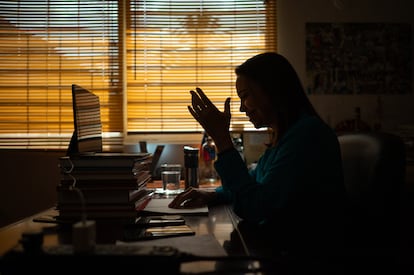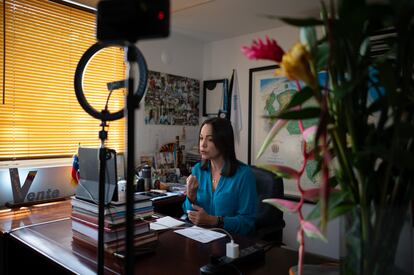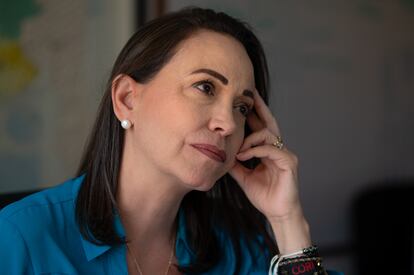María Corina Machado: ‘There is a real and growing opportunity to defeat Maduro’
The candidate for the Venezuelan opposition primaries, who is leading in the polls, talks to EL PAÍS about what she would do if she wins the nomination


One thing that can’t be denied María Corina Machado is her resillience. In recent years, her name had been practically forgotten in Venezuela: she was ignored by both the Nicolás Maduro government and the opposition. But today it’s her name that’s been repeated over and over in Venezuela and abroad. Machado — who represents the most radical wing of the anti-Chavismo movement — is leading in the polls for the opposition primaries in October that will determine who will face Maduro at the 2024 presidential elections. Machado previously argued against taking part in elections, arguing that it legitimazed the Chavista government, but with more than 50% support, it now looks like that she will be the one representing the opposition next year. Although she has been banned from public office, she believes that this has helped her chances at the primaries. And she says that if she wins it, she is willing to sit down with Maduro.
Machado is riding high, and it shows in her tone, which is very calm, and her discourse, which has become more moderate. Where before she called for Chavismo to be ended by force, now she talks about how Venezuelans have the strength to lead the transition to a new government that she says will be democratic, orderly and financially stable. She says that now is not the time for ideology and that the whole country — including Chavistas — is united by its shared feeling of pain and experience of exile (her three children are living abroad). She believes that this “existential and spiritual dimension” is strong enough to defeat Maduro at the polls.
Question. Do you know why you have been banned from public office?
Answer. The truth is that I don’t know the formal reasoning, but I do know the reason behind it: that the regime is afraid, there is no doubt about that.
Q. Does the decision change anything for you?
A. Yes, it gives the primaries a new dimension, it adds an element of challenge to the system. It is no longer just about the contrasting visions of different groups that are legitimately participating in the process. There are many people who tell me these days ‘I am empowering you with my vote.’ It made the process more appealing and powerful.
Q. You do not have close ties with the other opposition leaders. Have they come out to support you?
A. I have talked to practically everyone and the truth is that I have a very respectful relationship with most of them, even a warm one in some cases.

Q. What will you do if you win the primary?
A. It’s been a long time since we Venezuelans have had the chance to choose fairly and this is going to be a very uniting experience. The fight we are in now is not an ideological fight, it goes much further. All the divisions caused by Chavismo have been demolished by the destruction of our economy and quality of life, but above all by the separation of families. I feel that this proccess of uniting country is already taking place. The first thing I have to do, if I win the primary, is to make sure that everyone feels that it is a common project, a process that is not going to seek revenge or harm, but rather seek spaces for consensus. I am going to have to make a huge effort to contact international leaders from the democratic and not-so-democratic world, so that we are aligned on how to make the regime understand that it is in its best interest not to hinder a competitive electoral process.
Q. Would you sit down to negotiate with Maduro to lay down the foundations for a democratic election?
A. You have to do five things at once. The first thing is to unite the country. The second is to immediately contact [Colombian President Gustavao] Petro, [Brazilian President] Lula, [Mexican President Andrés Manuel López Obrador] AMLO and [Argentine President] Alberto Fernández, to tell them that we need them to make Maduro understand that this is what the international community is calling for. They are figures who can do a lot to push [the election] forward. Thirdly, it is necessary to specify what are the essential conditions for a competitive election. The fourth thing is to start a new stage of negotiation, which would have a position relatively different from the one that exists now, where there is no legitimate leadership, where there are different positions among different sectors of the Venezuelan opposition. With the primary, there will be a clear coordination of representation. That’s when a new negotiation period can be proposed with very clear terms to seek a democratic solution. And finally, a group of figures who have interests in Venezuela must be aligned by telling them that the country must first be recapitalized so that Venezuelans can have much better living conditions and, in parallel, generate great investment opportunities.
Q. Is there time for fair elections to be staged in 2024?
A. After the primaries, there would be 14 months. I think it is a long time.
Q. You have argued that the opposition legitimizes Maduro by taking part in elections. Have you changed your mind?
A. I ran in many elections until 2015. From then on, the regime put into practice a set of mechanisms that ensured the elections were just for pretence. Now, it is important not to confuse ends and means, and the end is the building of a democratic and free nation. We have all tried the means: protest, negotiation, international pressure, elections. There have been 35 elections in Venezuela in 20 years and in all of them there has been great manipulation. What’s the difference now? We have learned a lot from the regime’s manouvering, we have been strengthening as an opposition, we have put our feet on the ground. This is not an election like the one you can have in Spain or Colombia, here we are facing a tyranny that is ready for anything. This is a process of building forces and the primaries are a catalyst, an opportunity to bring together more sectors that until very recently had thrown in the towel with respect to Venezuela. There is a real and growing opportunity to defeat Maduro.
Q. And if Maduro decides to bring forward the elections or argues that the conditions for a vote have not been met?
A. I am not going to speculate on scenarios that are absolutely uncertain. They have shown in the past that they are willing to do anything, unless conditions or circumstances that we insisted on prevented them. I am dedicating all my time to growing the organization in order to engage the world in the importance of this moment and to raise the repercussions for the regime’s nonsense.
Q. If Henrique Capriles wins the primaries, for example, will you campaign for him?
A. We have agreed that the candidate who wins will be recognized by all other candidates. There is no doubt [that I would campaign].

Q. Will he campaign for you if you win?
A. I don’t know. The primary gives us much more than a candidate, it gives us the opportunity to elect a leadership that will have to lead the way to achieve both a date and the terms of the election. It will also give us a clear, unified and legitimate interlocutor vis-à-vis the international community, which I believe is one of the problems that exists today. There are different visions and different strategies that cause dissonance and that paralyze some people, while giving others the excuse to do nothing.
Q. How can Maduro be convinced to take part in negotiations?
A. Incentives must be created and we must see how we are going to manage the transition process and the relationship with those who have been in power for more than 20 years. We must facilitate the negotiation process, but also make them understand that, if they do not accept it, the situation in Venezuela would be increasingly difficult for them.
Q. What would you do with Chavista leaders if you became president?
A. We cannot generalize because there is a bit of everything. From people who are involved in crimes against humanity and are being investigated by the International Criminal Court to those who have been victims and prisoners of the system.
Q. Would you consider guaranteeing Maduro immunity?
A. What I would guarantee to Maduro is a fair trial, the same as to all Venezuelans.
Q. Why did the interim government of Juan Guaidó fail?
A. There were internal and external mistakes. I believe that Juan Guaidó was surrounded by a group of parties that did not give him room to move, which ended up imposing their interests and he succumbed to that control. It also underestimated what the regime was willing to do to preserve power. It is a mistake to believe that this is a dictatorial system with a hierarchical structure. This is a criminal system with a heterarchical structure. The incentives are very complex and the wrong approach was used with the regime and with the armed forces.
Q. When you defended ending the Chavista government by force, what were you referring to?
A. More people organized with a narrative, where you persuade international actors who have the ability to exert pressure, closing off some of the flows of money, information, weapons. What has happened is that Venezuelan society has given everything on several occasions and in the last stages, there have been highly responsible people in the leadership who for one reason or another have given up on the strategy. This was a huge disappointment, there are people who feel very betrayed. It is tremendously hopeful to see how that has vanished in a matter of months.
Q. Do you think that at some point it was possible to end the Maduro government through military action?
A. What we were saying to the international political world is that here is a country that has risen up, a country that is suffering a humanitarian catastrophe and that they have a responsibility to assist us and support us. That was the approach. Military actions have been carried out by the Chavismo. And when they talk about invasion, here the real invasion has been carried out by the Cubans, Russians, Iran, the Colombian guerrillas, the drug cartels, to whom the regime has handed over half of the territory in Venezuela.
Q. How do you describe the current role of the United States?
A. Erratic.
Q. Why?
A. In many cases, it’s confusing to Venezuelan society, when it comes to understading what the firm position is. And this is very important. Conditions are coming together that have never occurred in Venezuela. The society does not have long weapons, the regime does, but the regime no longer has people, we have the people. The regime is also running out of money. The morale of society is very important to us, it’s important to know that we are not alone. The world must understand that when a Venezuelan girl turns five, she is eight centimeters shorter than she should be, that what is happening here is a tremendous human catastrophe. That the cycnism of those who say that this is a narrative, that it is the far right inventing lies, is false. For God’s sake, this is not an ideological issue!
Q. You have three children abroad. Have you ever thought of leaving the country?
A. I took my children out because I received death threats, even though they didn’t want to leave, they didn’t want to leave me by myself. I took them out one by one and you don’t know the guilt I felt at not being able to be there on graduation days... When Enrique, the youngest, went to graduate, that night I was about to [leave the country]. I think it was the most difficult moment of my life, because in some way I felt that I was doing this for my children, but in the end I was failing them as a mother. I can leave, the problem is that they won’t let me come back.
Q. Do you trust that the president of Colombia, Gustavo Petro, wants to achieve a democratic solution in Venezuela?
A. At this point, Petro must have realized that the situation in Venezuela cannot go on. He is also going to have more problems: migration [to Colombia] is not going to stop, nor is the pressure from that gray area of the border. He should also know that Maduro neither wants nor can solve his problem with the [Colombian guerrilla group] ELN, because, what’s more, Maduro supports the ELN.
Q. Do you think that countries make decisions on Venezuela for their own benefit?
A. That is the history of humanity. What happens is that you can often manage to align the interests of those other actors with the interests of your country, and that is what I am working on. Anyone who believes that Nicolás Maduro can help solve an energy problem in any part of the world, does not understand anything about energy. From any point of view, all countries are in the interest of a democratic, orderly and solvent transition. And that’s what we stand for.
Q. Do you think Maduro would meet with you if your won the primaries?
A. He will have to negotiate with me.
Q. Are you willing to go to the Miraflores Palace to talk to him?
A. It remains to be seen where it would be, but the talks would address the issues that guarantee that Venezuela is moving towards a democratic transition, without a doubt.
Q. In recent elections in Latin America, the left has won. Would you take right to Venezuela?
A. The problem with the left is that everything to their right is far right to them. I am liberal and it is a life philosophy, it goes far beyond a political proposal.
Sign up for our weekly newsletter to get more English-language news coverage from EL PAÍS USA Edition
Tu suscripción se está usando en otro dispositivo
¿Quieres añadir otro usuario a tu suscripción?
Si continúas leyendo en este dispositivo, no se podrá leer en el otro.
FlechaTu suscripción se está usando en otro dispositivo y solo puedes acceder a EL PAÍS desde un dispositivo a la vez.
Si quieres compartir tu cuenta, cambia tu suscripción a la modalidad Premium, así podrás añadir otro usuario. Cada uno accederá con su propia cuenta de email, lo que os permitirá personalizar vuestra experiencia en EL PAÍS.
¿Tienes una suscripción de empresa? Accede aquí para contratar más cuentas.
En el caso de no saber quién está usando tu cuenta, te recomendamos cambiar tu contraseña aquí.
Si decides continuar compartiendo tu cuenta, este mensaje se mostrará en tu dispositivo y en el de la otra persona que está usando tu cuenta de forma indefinida, afectando a tu experiencia de lectura. Puedes consultar aquí los términos y condiciones de la suscripción digital.








































